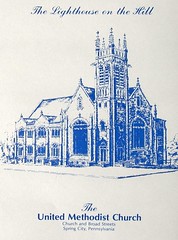On Scriptural Authority
February , 2009
Fourth Sunday after the Epiphany
“Souper Bowl of Caring” Sunday
On Scriptural Authority
Deuteronomy 18:15-20 and Mark 1:21-28
Jesus taught with authority, and not as the scribes... and they were astounded at his teaching. From Mark 1:22
My sermon outline:
• Today the #1 team in football will be decided. (#1 until next year...) Steelers could take the lead (tied @ 5 championships with 49ers and Cowboys. AFC champs.) Cardinals seeking first win.
I’m supposed to mention SB. American male. No one should make SB or anything else their reason or ground for being.
• Two texts today, story of Jesus exorcising an unclean spirit and being revered as one with authority (sadly apparently out of ordinary).
Text from Deuteronomy, God laying down the rules through Moses, saying how things’ll be... I’ll provide from among you prophets who will speak my words.
@ first glance no connection, but each passage speaks to authority
& if we are to be bearers and defenders of the faith (yes we ought) we must be able to speak with authority as well.
• Common objection to Bible is why should I give any authority to a book written by a bunch of men 2000 years ago, and translated who knows how many times since then? And what about the other gospels? DaVinci Code (03) introduced the average American to the Gnostic gospels, Philip and Thomas and Mary Magdalene, even Judas – why are these writings not biblical? Do they have any authority?
Granted, I’d bet that most who are asking those questions have not read Philip or Thomas or Mary or Judas, and admittedly I haven’t either, but I have researched about them, and can answer why they are not considered authoritative scripture...
• In science: reproducibility and peer review. Can other people get same results, and draw same conclusions?
• In study of ancient texts: reliability is on age (older = better) and quantity. 4 texts from 4th century not as strong as 25 texts from 2nd century.
In general the majority of the NT books are also the earliest writings and most copied, and in general, the gospels not included are fewer in quantity and they’re not as old.
• Additionally for the most part the Early Church Fathers held to the canon we know...
By mid 2nd century the 4 gospels were in their current form, and Irenaeus had a list of 21 NT letters he granted scriptural authority. Early 3rd century Origen had a list of 27, pretty much the same, and in the 300s the church was pretty unanimous about the canon.
The Gnostic gospels are not on the ECFs lists, so they either didn’t know about them, they hadn’t yet been written, or they agreed they weren’t canonical.
• Bottom line: the Bible as we know it was selected early on and while we don’t have originals we have many early texts that agree, and it’s upon them that today’s translations are based. There is textual reliability.
• John Wesley believed the content of the Bible leads the reader to trust it’s true, by reason of its miracles, prophecies, teaching, and character.
• & we cling to the Mosaic promise of God inspiring and speaking through folks today,
And the witness that on Christ the solid rock we stand...
Furthermore that when we gather together the Lord is among us
& when we gather in Holy Communion & ask the Spirit’s blessing, God is uniquely and specially and sacramentally present.
Here, O Lord, (in sanctuary, at Communion table) we see thee.
• Hymn 623 Here O My Lord I See Thee
- Pastor Kerry
This Sunday: 75 in worship.


0 Comments:
Post a Comment
<< Home